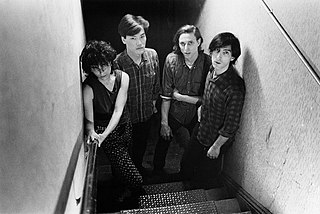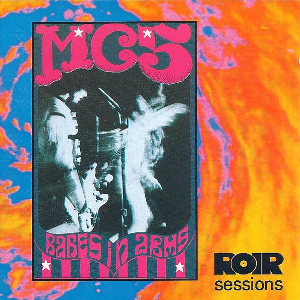Punk rock is a music genre that emerged in the mid-1970s. Rooted in 1950s rock and roll and 1960s garage rock, punk bands rejected the corporate nature of mainstream 1970s rock music. They typically produced short, fast-paced songs with hard-edged melodies and singing styles with stripped-down instrumentation. Lyricism in punk typically revolves around anti-establishment and anti-authoritarian themes. Punk embraces a DIY ethic; many bands self-produce recordings and distribute them through independent labels.

Richard Lester Meyers, better known by his stage name Richard Hell, is an American singer, songwriter, bass guitarist and writer.

Television was an American rock band from New York City, most notably active in the 1970s. The group's most prominent lineup consisted of Tom Verlaine, Richard Lloyd (guitar), Billy Ficca (drums), and Fred Smith (bass). An early fixture of CBGB and the 1970s New York rock scene, the band is considered influential in the development of punk and alternative rock.

Richard Hell and the Voidoids were an American punk rock band, formed in New York City in 1976 and fronted by Richard Hell, a former member of the Neon Boys, Television and the Heartbreakers.

Wire are an English rock band, formed in London in October 1976 by Colin Newman, Graham Lewis, Bruce Gilbert (guitar), George Gill and Robert Grey. They were originally associated with the punk rock scene, appearing on The Roxy London WC2 album, and were instrumental to the development of post-punk, while their debut album Pink Flag was influential for hardcore punk.

Blank Generation is the debut studio album by American punk rock band Richard Hell and the Voidoids. It was produced by Richard Gottehrer and released in September 1977 on Sire Records.
Robert Wolfe Quine was an American guitarist. A native of Akron, Ohio, Quine worked with a wide range of musicians, though he himself remained relatively unknown. Critic Mark Deming wrote that "Quine's eclectic style embraced influences from jazz, rock, and blues players of all stripes, and his thoughtful technique and uncompromising approach led to rewarding collaborations with a number of visionary musicians."

John Anthony Genzale, known professionally as Johnny Thunders, was an American guitarist, singer and songwriter. He came to prominence in the early 1970s as a member of New York Dolls. He later played with the Heartbreakers and as a solo artist.
The Heartbreakers, sometimes referred to as Johnny Thunders and the Heartbreakers, were an American punk rock band formed in New York City in 1975. The band spearheaded the first wave of punk rock.

L.A.M.F. is the only studio album by the American punk rock band The Heartbreakers, which included Johnny Thunders, Jerry Nolan, Walter Lure and Billy Rath. It was released on October 3, 1977 by the British independent record label Track Records, and the music of the album is a mixture of punk and rock and roll.

Paranoid Time is the debut EP by American hardcore punk band Minutemen. It is also the second ever release by the SST record label, founded by Black Flag's Greg Ginn and Chuck Dukowski. The album cover is a drawing by the American artist Raymond Pettibon.
The Neon Boys were a short lived New York City proto-punk band, composed of Tom Verlaine, Richard Hell and Billy Ficca. The trio later went on to form the influential rock band Television in 1973; Richard Hell also went on to form the influential punk bands the Heartbreakers and Richard Hell and the Voidoids.
Rip Rig + Panic was an English post-punk band founded in 1980 and disbanded in 1983. The band was named after the 1965 jazz album of the same name by Roland Kirk. It was formed by Sean Oliver (bass), Mark Springer, Gareth Sager and Bruce Smith — the latter two formerly of The Pop Group) — with singer Neneh Cherry. Other members included saxophonist Flash, singer Andi Oliver, trumpeter David De Fries, and viola-player Sarah Sarhandi.
Red Rockers were an American musical band from New Orleans, Louisiana, United States, active from 1979 to 1985. Originally formed as a hard-charging punk rock band, they changed their style to a smoother, more melodic sound and released two albums in the new wave vein of their record label, 415. They are best known for their 1983 hit single "China".

Live Skull is a post-punk/experimental rock band from New York City, formed in 1982.

Destiny Street is the second and final studio album by American punk band Richard Hell and the Voidoids. It was released in 1982 by record label Red Star.
Dim Stars was an alternative rock supergroup active briefly in the early 1990s. The group was composed of bassist Richard Hell of Richard Hell and the Voidoids, guitarist Thurston Moore and drummer Steve Shelley from Sonic Youth, guitarist Don Fleming from Gumball; there was some guitar work by Robert Quine, also of the Voidoids. Their initial release was a limited-edition set of three 7" EPs, which was later released as one CD on compact disc in 1992. This was followed by a full-length album, which was regarded as a showcase for Hell's songwriting abilities. The group did not tour together and essentially disbanded after the release of the LP.

Babes in Arms is an album by the American band MC5, released in 1983. Originally released as a cassette, it has been reissued several times.

"Blank Generation" is the title track of Richard Hell and the Voidoids' 1977 debut album Blank Generation. A rewrite of Bob McFadden and Rod McKuen's 1959 record "The Beat Generation", Richard Hell wrote the new lyrics during his time with the band Television, and performed it live with another band, The Heartbreakers. Malcolm McLaren claimed that the Sex Pistols' song "Pretty Vacant" was directly inspired by "Blank Generation".

Hip Priest and Kamerads is a 1985 compilation album by British rock band The Fall, containing tracks taken from their releases on the Kamera label together with a previously unreleased live track from the same era. It was subsequently reissued with a further four live tracks added.













